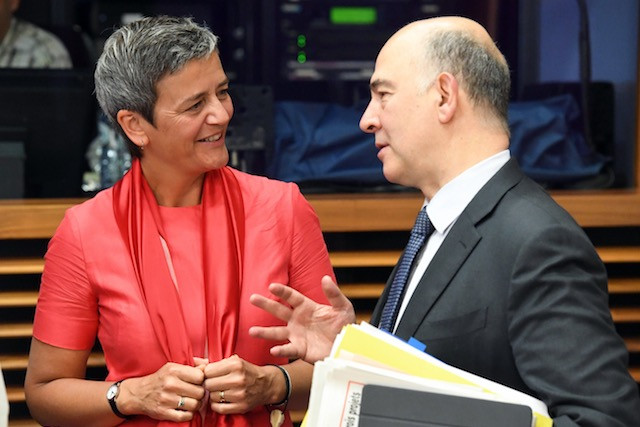The EU executive body will propose making permanent the rule that value added tax on cross-border sales within the bloc is paid in the country where the customer is located.
Prior to an interim system introduced in 2015, VAT was paid in the country where the vendor company was based.
The Reuters news agency reported on 3 October:
“‘This definitive VAT system will be based on the principle of taxation in the member state of destination,’ the document, seen by Reuters, said. The proposed changes are expected to permanently end tax advantages for supplier companies that serve the EU market from a low-tax country, like Amazon, which is based in Luxembourg.”
Politico magazine said on 3 October:
“As part of the VAT overhaul in Europe, [European finance commissioner Pierre] Moscovici is expected to propose measures to alter how countries charge value-added tax in a bid to simplify the system and curb cross-border fraud that amounts to billions of euros.”
Separately, Brussels is likely to give a three-month reprieve before filing a “non-compliance” action against Ireland for failing to collect €13bn is disputed back taxes from Apple, the Irish Independent reported on 4 October.
The commission told the US technology firm to pay the sum in August 2016. Dublin was meant, by 3 January of this year, to place the money in an escrow account while the matter is appealed, which could take up to five years.
As the Bloomberg news agency explained on 2 October:
“In the Apple case, part of the delay may stem from negotiations over the terms of the escrow account, as Ireland sought an indemnity to make sure it isn’t liable for any drop in the value of the fund while the case winds its way through the EU courts. In the end, it was agreed that Ireland and Apple will jointly choose investment managers, a decision which could sidestep the need for a formal indemnity.”
If Dublin does not meet the deadline, then Brussels could take action against Ireland at the European Court of Justice.
European competition commissioner Margrethe Vestager is also expected on Wednesday to tell Amazon to pay millions of euro in back taxes to Luxembourg.
UPDATE, 4 October 2017, 12noon:
The European Commission said that Luxembourg should collect €250m in back taxes from Amazon.
UPDATE, 4 October 2017, 12:30pm:
The European Commission has decided to pursue legal action at the European Court of Justice against the Irish government in the Apple case.
Margrethe Vestager, the EU competition commissioner, said in a statement on 4 October:
“Ireland has to recover up to 13 billion euros in illegal state aid from Apple. However, more than one year after the commission adopted this decision, Ireland has still not recovered the money, also not in part. We of course understand that recovery in certain cases may be more complex than in others, and we are always ready to assist. But member states need to make sufficient progress to restore competition. That is why we have today decided to refer Ireland to the EU court for failing to implement our decision."
Ireland’s finance ministry said in a statement:
“Ireland has never accepted the commission’s analysis in the Apple state aid decision. However, we have always been clear that the government is fully committed to ensuring that recovery of the alleged Apple state aid takes place without delay and has committed significant resources to ensuring this is achieved. Ireland fully respects the rule of law in the European Union. That is why it is extremely disappointing that the commission has taken action at this time against Ireland.”
The Irish government also said:
“It is extremely regrettable that the commission has taken this action, especially in relation to a case with such a large scale recovery amount. Ireland has made significant progress on this complex issue and is close to the establishment of an escrow fund, in compliance with all relevant Irish constitutional and European Union law.”
As of this writing, Apple had not returned Delano’s message seeking comment.
